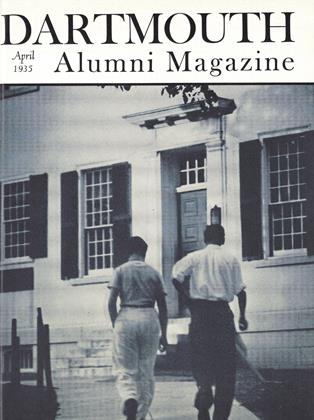IN ADDRESSING the annual gathering of the Dartmouth Alumni Association of Boston, March 7, President Hopkins revealed important direction signs on the road to be travelled by the College. At the same time he refuted those alarmists who saw the marks of fascism and militarism in press reports of his remarks upon returning from Italy a month ago.
The President spoke to the Boston alumni of two things: the first having to do with internal organization; the other with external support. The importance of what he hopes will be the direction of curricula and instructional policy at Dartmouth is revealed in the closing lines of his remarks:
"Thus we come to Lhe ideal that is themental picture of what the College shouldbe. To realize that ideal and to make itconvincing to youth requires vision, conviction, and courage on the part of. alumnibodies, if the indispensable support is tobe available zuhich shall give power to theeducational program of the College.
"Specifically, may Dartmouth countupon your understanding for and supportof such a policy? Is this not the picture youwould paint of what the College should be?
The support of alumni is called for, and their understanding of a new emphasis in Dartmouth policy is specifically requested by the President. The Boston address is published in full in this issue of the MAGAZINE. Careful reading of it will be enlightening, both as to what are his thoughts for a change in educational methods and in answer to those who feared that compulsory military training might become part of a new era of dreary discipline and rigid regimentation in Hanover! Says President Hopkins: "So far as I am personally concerned, it is inconceivable to me that anyintelligent man should be willing to exchange his status as an American citizen forthe intellectual and spiritual stultificationswhich prevail among those peoples whohave delegated either voluntarily or undercoercion their lives, liberties, and possibilities of happiness to the state."
In this particular connection he pays tribute to those peoples who are developing fortitude and are loyally cooperating toward a common cause, for: "Unless we arewilling in some like degree to commit ourselves to self-discipline and are willing toseek fortitude and moral stamina, we mustinevitably suffer in comparison with peoples who, whether mistakenly or not, areworking together in a great unifying efforttoward specific ends."
The President has spoken often during the past two years of his growing conviction that a reshaping of the curriculum to give greater emphasis to the social sciences is desirable. He now states this to be a conviction and asks for the "prompt and radical modification of the curriculum" to make it possible for undergraduates "tolearn the fundamental principles of government, economics, and social relations,with the historical data illustrative ofthese."
It is our belief that alumni will, by and large, agree with the President's suggestions. There was a time, and not long ago, when colleges were eager to be cloistered communities. They were apart from the busy whirl of life, not so much physically as intellectually. But times change and so must the emphases put upon the teaching policies of the colleges to keep pace with them. President Hopkins stated in the Boston address the fundamentals of what he seeks, of what the College must have in mind in shaping its curriculum, of how far he is willing to be committed to a new discipline:
"There are among us grievous fallaciesin the generally accepted social theories ofwhat constitutes democracy, and there arevital defects in our practice of government.The correction of these, however, is in thedevelopment of processes which will enlarge intelligence and develop understanding not only of what is, but of what mightbe. Salvation does not lie in exchange ofour liberties for political, intellectual, orspiritual serfdom. It lies in acceptance ofa conception which asserts that liberty under law is the most enviable possession towhich man may aspire, but that theamount of liberty to which an individualor a group is entitled is measured by theextent to which responsibility will be accepted to hold its liberty as a trust."
 View Full Issue
View Full Issue
More From This Issue
-
 Article
ArticleHANOVER BROWSING
April 1935 By Herbert F. West '22 -
 Article
ArticleSTABILIZATION BY SPECIE PAYMENTS
April 1935 By Edward Tuck '62 -
 Class Notes
Class NotesClass of 1908
April 1935 By L. W. Griswold -
 Class Notes
Class NotesClass of 1910
April 1935 By Harold P. Hinman -
 Class Notes
Class NotesClass of 1918
April 1935 By Allan C. Gottschaldt -
 Class Notes
Class NotesClass of 1929
April 1935 By F. William Andres
The Editors
-

66 New Reasons to Love Dartmouth
SEPTEMBER | OCTOBER 2023 -
 Article
ArticleFootball Schedules
December 1934 By The Editors -
 Article
ArticleJohnny Johnson
January 1935 By The Editors -
 Article
ArticleAmong the Freshmen
January 1935 By The Editors -
 Article
ArticleThe Cover
January 1935 By The Editors -
 Article
ArticleGrowth by Leaps and Bounds
April1935 By The Editors








